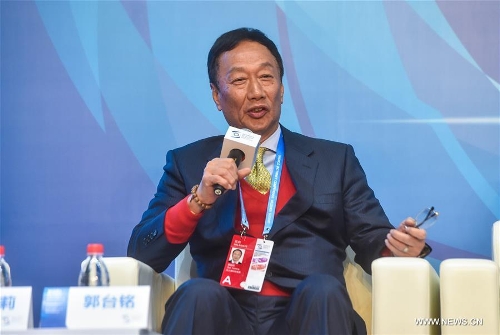Terry Gou announces election bid
Support for Gou reflects island yearning for change: observers

Terry Gou, founder of Foxconn Technology Group, speaks during the Cross-Strait and Hong Kong, Macao Internet Development Forum of 2015 World Internet Conference in Wuzhen, east China's Zhejiang Province. Photo: Xinhua
Terry Gou, founder and chairman of Foxconn, announced on Wednesday he would run next year's Taiwan regional leadership election. The news was received with wide-scale support from within the island. Being a businessman and now delving into politics, local people anticipate positive change in the economy with him at the helm.
This enthusiasm makes it very evident that the people in the island are eager for a change and want a respite from the worsening cross-Straits situation caused by the pro-secession Democratic Progressive Party (DPP) which currently governs the island, experts noted.
Gou, the richest man in Taiwan also known as Guo Taiming, announced his decision on Wednesday to run as a candidate of the pro-reunification KMT party.
Gou said he decided to run after receiving instructions from Mazu in his dream. Mazu is the Chinese goddess and patroness of the sea who is widely worshiped by people of coastal regions in China.
"I had a dream in which the goddess of the sea encouraged me to 'come forward' to support cross-Straits peace and do good things and bring hope to young people," Gou said, according to Taiwan's Central News Agency.
The 68-year-old businessman, who now leads Foxconn, the world's largest original equipment manufacturer and a major contractor for US tech giant Apple, has a large business footprint on the Chinese mainland. Gou's decision has sparked hot discussions across the Taiwan Straits.
"He is not stepping down [from Foxconn] but switching to a non-leading position, making more room for young people while still focusing on strategic directions," a Foxconn spokesperson told the Global Times Wednesday.
Gou also said at a media event that he wasn't thinking about the elections until six months back, but later he began to feel that young people on the island needed a future, Forbes reported on Wednesday.
Gou said that "peace, security, economy and the future" should be the key focus while solving the Taiwan question, and promised a bright future to the young generation if he is elected to the position of Taiwan's regional leader.
Taiwan wants change
Gou is a renowned business leader who enjoys close ties with the political and business circles both in the Chinese mainland and the island of Taiwan, and is well-known in the international community, Zhu Songling, a professor at the Institute of Taiwan Studies of Beijing Union University, told the Global Times on Wednesday.
"He will help stabilize cross-Straits relations if he becomes the leader of the island," Zhu said.
An online survey conducted by Taiwan-based news portal udn.com, where about 27,000 web users participated, showed at press time that more than 80 percent of netizens in Taiwan are in favor of Gou as the leader. A comment on his personal Facebook account said, "Taiwan has been lost for some time now, and it is time to get it back on the right track."
As a famous entrepreneur, Gou's popularity shows Taiwan's public opinion has undergone subtle changes since 2016 [when DPP took power]. Now the public is calling for those who can bring peace and development across the Taiwan Straits to become leaders of the Taiwan region, Zhu told the Global Times.
Han Kuo-yu, another KMT senior party member and the mayor of Kaohsiung, received more than 5,000 votes in the survey following Gou, and he is also a supporter of the one-China principle. He visited the mainland and met with the mainland officials in March.
Gou has benefited from economic exchanges across the Taiwan Straits in the past years, and he is bound to witness cross-Straits relations moving toward a better direction, Wang Jianmin, a fellow researcher from the Institute of Taiwan Studies under the Chinese Academy of Social Sciences, said.
Gou founded Hon Hai/Foxconn Technology Group in the Taiwan region in 1974 and opened his first factory in the Chinese mainland in 1988. Gou and Foxconn seized the opportunity of the mainland's opening-up and moved up in the global economic chain. By August 2017, Forbes listed his net worth at $10.6 billion.
Hon Hai-related stocks rose elsewhere in the region on Wednesday. Foxconn Industrial Internet Co. climbed by the 10 percent daily limit in Shanghai. FIH Mobile Ltd. jumped 25 percent as of 3:34 pm in Hong Kong, and is all set for the biggest gain since November 2012, reported by Bloomberg on Wednesday.
Pressure should remain
Some raised the question whether Gou, with no previous political experience, can be a successful regional leader. There are also people who compared Gou to US President Donald Trump, who also transitioned to politics from business.
Business leaders are more pragmatic and down-to-earth than traditional politicians, and are expected to bring some hope to the pressing economic and livelihood issues in Taiwan, Wang said
"Gou is the chairman of the leading high-tech conglomerate that boasts the global vision and open-minded ideas. His business accomplishments are universally acclaimed in business circles. He can be more flexible in making relevant policies and strategies if he is the one to hold power some day," Zhu said.
Tsai Ing-wen, the current leader of Taiwan region, will have a high probability of losing the election if she locks horns with Gou, but the mainland should not pin its hopes on eliminating the risk of Taiwan independence through the election on the island, experts on Taiwan studies from the mainland said.
The increase in military deterrence and economic pressure from the mainland are the most important factors to contain secessionists in Taiwan, which is also the foundation of the peace in the Taiwan Straits, so the pressure of the mainland needs to be strong enough to remind Taiwan people that confrontation with the mainland and seeking secession is a dead end, experts noted.

